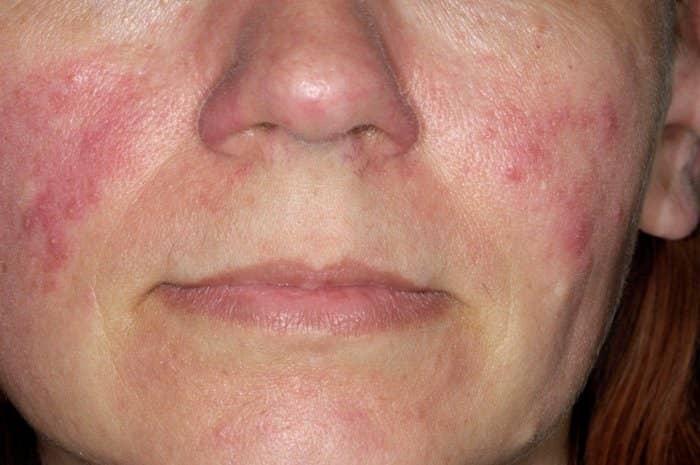
1. Drink more water
You should drink at least 8 eight ounce glasses a day – more if you work outside or play sports. Heat and exertion cause vascular dilation (what the rest of us call flushing) in most people, so those with rosacea need to drink even more water – the colder, the better.
2. De-stress your life.
Stress is the byproduct of your body’s reaction to a threatening situation – either real or imagined. When your body is stressed, it releases adrenaline and hormones into your system and your pulse rate rises, aggravating rosacea. If certain activities or situations stress you out, find a healthy way to relieve the stress – breathing exercises, meditation or a quick stroll. Just getting adequate sleep (at least eight hours a night) could work wonders.
3. Avoid stimulants.
Yes, that means coffee. And tea. Cigarettes, sweets, and sodas too. Stimulants (even those without sugar like diet sodas) are vascular dilators, so they can make your rosacea even worse. But if you’re sleeping eight hours a night, giving up that morning coffee might not be as hard as you think.
4. Avoid alcohol.
Alcohol is a diuretic, so it pushes water out of your cells. This leads to increased urine production, which leads to dehydration. And when you’re dehydrated, your pores shrink, so they become more and more susceptible to clogging. If you do drink alcohol, be sure to do it in moderation and follow it with lots of water to help keep your body hydrated and avoid rosacea flare-ups.
5. Bathe carefully.
Avoid hot baths. Instead, use warm water (below body temperature) so you don’t redden your face even more. Also be careful when washing your face. Irritating your skin is the last thing you want to do, so avoid scrubbing with your wash cloth and steer clear of cleansers with abrasives – even those that claim the abrasives will declog your pores. Also avoid astringent cleansers that shrink your pores like witch hazel, alum, oatmeal and rubbing alcohol – shrunken pores trap more bacteria in your skin.
6. Watch what you eat.
Foods high in simple carbohydrates like pastas and breads can cause your blood sugar to spike and have the same effect on your rosacea as a stimulant like coffee. Some common rosacea-triggering foods are: vinegars, hot spices, peppers (including black pepper), tomatoes, citrus fruits and juices, bananas, red plums, raisins, figs, cheese, chocolate, liver, yogurt, sour cream, vanilla, soy sauce, yeast extract, eggplant, avocados, spinach and broad-leaf beans and pods. Not all (or even any) of these foods may cause a rosacea flare-up in you, but when you do identify a food culprit – avoid it in the future!
7. Exercise.
Of course, exercise in moderation to keep flare-ups in check, but an elevated heart rate and the total body benefits of exercise can help your rosacea as long as the activity itself doesn’t set off an outbreak. One of the best exercise options for rosacea sufferers is swimming in a properly maintained chlorinated pool. The chlorine can help kill acne-causing bacteria and the pool is still below body temperature, so it cools you even as you exert yourself.
8. Avoid the sun.
While sunlight does kill bacteria, it also tightens, dries, and clogs your pores. According to one study, the sun directly affects 61% of all rosacea sufferers. And extremely cold weather can be just as bad for your pores. Use a light noncomedogenic moisturizer – preferably with a high SPF rating and avoid extremely hot and extremely cold temperatures whenever possible.

